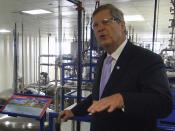Performance-Enhancing Supplements
No one likes a "cheater." There is no reason that a person should be allowed to take any kind of supplement that increases his or her ability to perform well. It's extremely unfair to the athletes who exercise and train to stay competitive. It is also unfair to the users of the supplements. They are enhancing their abilities but at what cost? Sometimes an athlete may not even know the consequences they must face from the intake of these various substances. Sometimes they'll simply ignore all the warnings thinking that it will never happen to them. Their accomplishments could be tainted by the use of performance-enhancing supplements. The use of performance-enhancing substances should be prohibited by sports organizations and regulated by the Food and Drug Administration (FDA) especially if they could cause damage to others or oneself.
There is a wide range of performance-enhancing substances. Some you've heard of from their notorious backgrounds and some you would have never expected to be very dangerous.
Ginseng, for example, is an herb that claims to improve overall energy and vitality, particularly during times of fatigue or stress. It comes form the root of the plant Panax ginseng, which takes about four to six years to plant and harvest (Lieberman 3). Ginseng can come in the form of powder, liquid, tablets, and capsules (Lieberman 4). The earliest description of Ginseng is found in ancient Chinese pharmacopoeia believed to date from the first century A.D. The Chinese and Native Americans have used it for centuries. It was used for its calming effect. The Ancient Chinese said it brightened the eyed, enlightened the mind, and increased wisdom. It was used to cure digestive disorders, cardiovascular illness, nervous system diseases, and pulmonary maladies (Lieberman 2). They used it also to travel for days...


